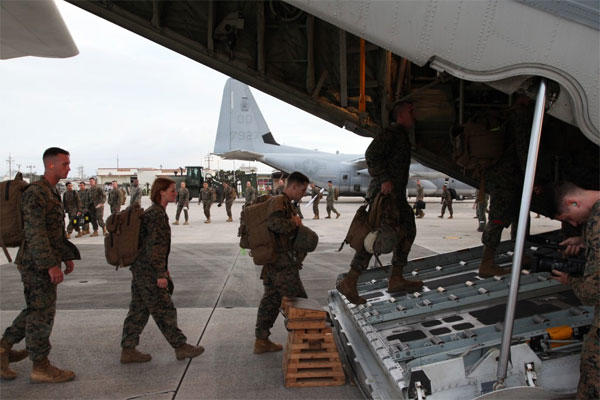Japanese Prime Minister Shinzo Abe and Okinawa's governor appeared set Thursday to sign a long-delayed deal to close the controversial Marine Corps Air Station Futenma and build a new base for the newly arrived MV-22 Ospreys and other aircraft in a less populated area of the island.
The tentative agreement was seen as key to the long-range U.S. "pivot" of forces to the Pacific region and the nationalistic Abe's new $240 billion defense strategy aimed at countering China by bolstering Japan's Self-Defense Forces with fleets of Ospreys and F-35 fighters.
On Christmas Day, Abe and Okinawa Gov. Hirokazu Nakaima met in Tokyo to hash out plans on easing the island's burden of hosting most of U.S. Forces Japan, including building a replacement base to Futenma at a seaside area in Henoko in the Nago Okinawa Prefecture.
"I am surprised at how well the measures address the issues at hand," Nakaima said following the meeting with Abe, Japan's Asahi Shimbun newspaper reported.
Also on Christmas Day, Defense Secretary Chuck Hagel announced agreement with Japan to address environmental concerns involving land reclamation for the proposed new air base in Henoko.
"This framework will help guide our activities going forward related to our shared goal of reducing impact to Japan's precious natural landscape as we continue to conduct operations that provide for the common defense of Japan," Hagel said in a statement.
The Futenma base and the presence of about 20,000 U.S. troops on Okinawa have been the targets of long-running protests by island residents. As part of the plan to ease Okinawan concerns, the U.S. has also committed to move about 9,000 Marines off Okinawa to Guam and Hawaii in the mid-2020s. Japan has agreed to contribute $3.1 billion to the relocation of the Marines and the construction of new facilities on Guam.
The potential Okinawa deal -- which could still be scuttled by local opposition -- came amid rising tensions in the region over China's Nov. 23 declaration of an Air Defense Identification Zone (ADIZ) in the East China Sea over disputed uninhabited islets claimed by both Japan and China.
The Japan-China dispute over the islands, called the Senkaku by Japan and Diaoyu by China, was exacerbated by Abe's visit on Dec. 25 to the Yasukuni Shrine to Japan's 2.5 million war fatalities. Among those honored at Yasukuni are 14 World War II war criminals, including executed Prime Minister Hideki Tojo.
Abe, wearing a morning coat and striped grey trousers and after spending about 15 minutes at the Shinto shrine in central Tokyo, said, "I prayed to pay respect for the war dead who sacrificed their precious lives and hoped that they rest in peace." He added, "I have no intention to neglect the feelings of the people in China and South Korea."
Still, the visit infuriated Beijing and Seoul. Both countries were victims of Japan's wartime atrocities.
"If Abe really respects his neighbors and wants to improve relations, he should visit the Nanjing Massacre Memorial Hall instead of the Yasukuni Shrine," Chinese Foreign Ministry spokesman Qin Gang said.
An estimated 300,000 Chinese were killed over six weeks by Japanese invaders after they occupied the city of Nanjing in east China's Jiangsu Province on Dec. 13, 1937.
South Korea condemned the visit and summoned a top Japanese diplomat in Seoul to protest. "We cannot withhold regret and anger over the visit," said Yoo Jin-ryong , the country's minister of culture, sports and tourism.
South Korea recently raised tensions with Japan and China with the Dec. 8 announcement that Seoul's existing air defense zone was being expanded about 150 miles to the south to include a submerged reef called Ieodo in South Korea and Suyan Rock in China.
Maj. Gen. Chang Hyok, a senior South Korean Defense Ministry official, said that in declaring the zone "our top priority is to prevent accidental military clashes in the area."



























